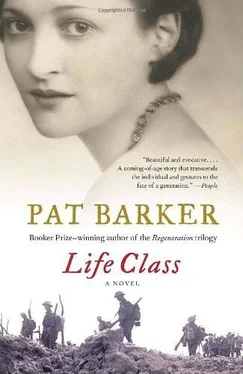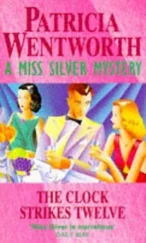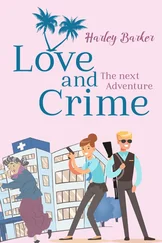He wanted to say, Why should I spend my days off nursemaiding Lewis? But then he remembered a number of occasions after he’d first arrived when Hickson, for example, had knocked on the door of the hut and almost dragged him into town. ‘All right. I’ll see what I can do.’
He went back to the ward and found Lewis sitting by Goujet’s bed again. ‘Come on,’ Paul said, touching him on the shoulder. ‘He’ll still be here tonight.’
Sister Byrd approved of Paul because she mistook his surface composure for real detachment. In fact he was every bit as moved by Goujet’s predicament as Lewis, but hid it better. It would be better for everybody, he thought, if Goujet died. But at the start of Paul’s next night duty, Goujet looked, if anything, stronger. His colour was better, and he was waving his arms at the orderlies as they walked past. Close to, though, he didn’t look so good. His skin felt hot and dry, and the mangled words didn’t seem to be directed at an audience.
By two in the morning he was running a high fever. He kept making movements in the air with his right hand, brushing something away perhaps. At last, going across to him for the umpteenth time, Paul realized he was trying to convey that he wanted to write. He couldn’t make himself understood in any other way. Part of his tongue and the roof of his mouth had gone.
‘Paper? You want to write?’ Paul made scribbling movements in the air.
Goujet nodded. Paper, Paul thought, looking round. They had the record sheets they filled in hour by hour, but nothing else. Over in the hut, he had whole pads of the stuff.
‘Can you spare me a minute?’ he asked Hickson. ‘I just want to go back to the hut and get something.’
He walked out into the night. Always this shock of cool air on the skin, the moist smell of earth and wet grass. The moon was full, riding high and magnificent in a clear sky. From the road came the roar of motor lorries going to the front, and further off, in the distance, the bickering of artillery.
The open door set an oblong of moonlight across the beds and the jumble of papers on his side of the table. He grabbed a writing pad and pencil, paused in the doorway to light a cigarette, and set off across the waste ground to the shed at a half-run. The air was fresh and crisp. The puddle that lay in the hollow ground by the ambulances’ turning circle had a grey film of petrol across it, like a cataract. He stopped to draw breath. An incongruous moment, standing there in the darkness, bracing himself to go back on to the ward, thinking like a painter. Deep breaths, one, two, three. A final drag on the cigarette and he pushed the door open.
Goujet stared at the writing pad and pencil in apparent bewilderment, so perhaps it wasn’t what he wanted and the waving of his hand in the air meant something else entirely. Paul left the pad by his bed and, by the time he’d reached the end of the row, Goujet had reached for it and begun to write. He didn’t seem to be keeping to the lines, but then the poor devil could hardly see. Paul brushed the incident aside, turning his attention to another patient who’d just been brought in from theatre.
The new patient woke everybody with his screams. Sister had her hands full trying to settle him. What had been a relatively quiet shift became busy. Paul and HIckson attended to the other patients as best they could. As Paul passed his bed, Goujet offered him a sheet of paper. There were no words on it and no drawings either, it was meaningless scribble as far as he could see. But he smiled and nodded. ‘Merci.’
It happened again, and again, at intervals as the night wore on.
‘Merci.’
‘Merci.’
‘Merci.’
Mercy, he started to translate it after a while. Precious little of that round here, he thought, looking at the body of a young man who hadn’t recovered consciousness, and wouldn’t last the night.
Up and down. Up and down.
Goujet became more insistent as the night wore on, more obviously deranged. As far as you could tell. But it’s difficult to know whether somebody’s mad or not if he can’t speak. What he wanted, and he made this very clear, was for Paul to take the paper from him and keep it. By the end of the shift, the pockets of Paul’s tunic and breeches were stuffed full of folded pages, every one of them marked by lines and lines of scribble. Only when the pad had been used up, did Goujet lie back, apparently satisfied.
Lewis didn’t appear that morning. No doubt Sister Byrd had talked to him. His absence was rather disconcerting. Paul had grown used to seeing him there.
Going off duty, he stood for a moment in the doorway, smelling the dawn wind. Two miles away, no more noticeable than the beating of his heart, the guns thudded: the usual early-morning intensification of fire. He took the sheets of paper from his pocket, bunched them together and tore them into tiny pieces. Released on to the wind, they whirled high above his head then slowly, bit by bit, drifted down till they lay on the bare ground. A driver was bending down, turning the crank handle of his ambulance. Soon, within a minute or two, the big wheels would force the scraps of paper deep into the mud, but before that could happen Paul had already turned away.
Elinor stood in the stern of the ferry, looking out over bile-green water streaked with foam. It was growing dark. Soon she’d have to give in and go below deck like everybody else, but meanwhile she was enjoying the mixture of spray and drizzle blowing into her face.
The forbidden zone.
It was by no means certain they’d let her in, though she’d done everything in her power to make her story credible. Under her coat she wore a nurse’s uniform, borrowed from Ruthie, who worked in a hospital now. Ruthie, who disapproved of this trip, who’d called it selfish and trivial and irresponsible. Ruthie, who’d given up painting and thought everybody else should do the same, but loved her too much to deny her anything. She’d used Ruthie — and not for the first time. She ought to stop doing it, and of course she would; but not yet. In her handbag, she had letters typed on hospital paper taken from her father’s desk, recommending her to the chief surgeon at Paul’s hospital. Oh, she’d worked hard to get everything right. Appearance, too. This old-maidish felt hat, a scrubbed and shining face, short-clipped fingernails, long skirt, sensible lace-up shoes. They ought to let her in. She believed her story.
A sailor walked past and stared at her. A young woman travelling alone, unchaperoned, would always attract attention and she couldn’t afford to do that. She ought to go down below deck and find herself a group of nurses to tag along with. Cautiously, she went down the narrow stairs into the passage with its wet footprints and puddles of water, and then, bracing herself against the rolling of the ship, edged along the wall till she reached the ladies’ cabin.
A fug of warm bodies greeted her, that female smell of talcum powder and blood. It always reminded her of the time when, as a little girl, nine or ten years old perhaps, she’d opened the drawer of Rachel’s dressing table and found a pile of blood-stained rags waiting to go into the wash. Mother had been furious with Rachel for leaving them where Elinor could find them. ‘It might have been Toby!’ she’d shouted, her voice edging up into hysteria. Elinor had looked from one to the other and tried to work out what the fuss was about.
Stepping inside the cabin, she closed the door quietly behind her. Most of the ladies had already become lumps under blankets, but a few were still undressing, placing hats carefully into hatboxes, covering them with tissue paper, lining shoes up neatly side by side. In the centre of the room a girl with straggly dark hair was feeding her baby, a wizened little creature whose hand clawed at her breast.
Читать дальше












